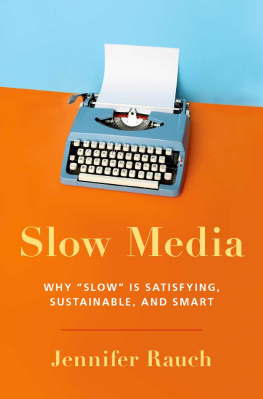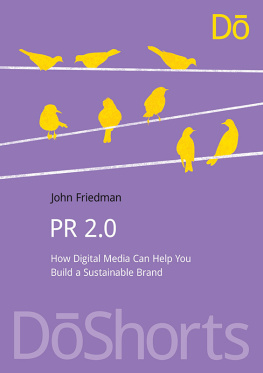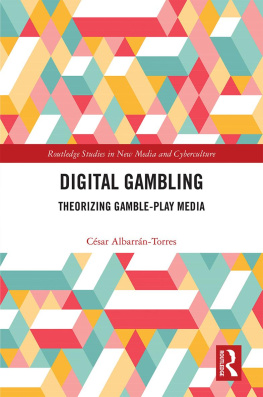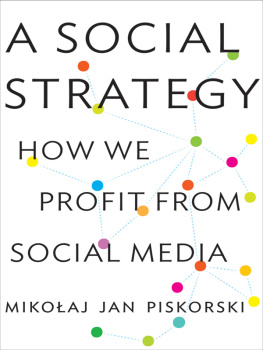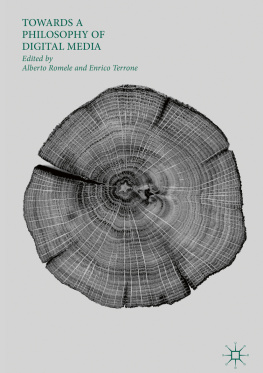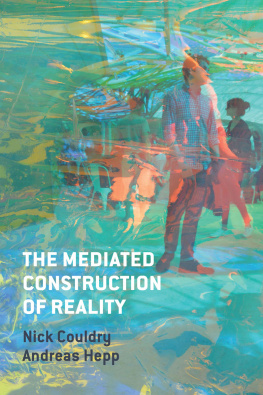Slow Media
Slow Media
WHY SLOW IS SATISFYING, SUSTAINABLE, AND SMART
JENNIFER RAUCH


Oxford University Press is a department of the University of Oxford. It furthers the Universitys objective of excellence in research, scholarship, and education by publishing worldwide. Oxford is a registered trade mark of Oxford University Press in the UK and certain other countries.
Published in the United States of America by Oxford University Press
198 Madison Avenue, New York, NY 10016, United States of America.
Jennifer Rauch 2018
All rights reserved. No part of this publication may be reproduced, stored in a retrieval system, or transmitted, in any form or by any means, without the prior permission in writing of Oxford University Press, or as expressly permitted by law, by license, or under terms agreed with the appropriate reproduction rights organization. Inquiries concerning reproduction outside the scope of the above should be sent to the Rights Department, Oxford University Press, at the address above.
You must not circulate this work in any other form and you must impose this same condition on any acquirer.
Library of Congress Cataloging-in-Publication Data
Names: Rauch, Jennifer, author.
Title: Slow media : why slow is satisfying, sustainable and smart /
Jennifer Rauch.
Description: New York, NY : Oxford University Press, [2018] |
Includes bibliographical references and index.
Identifiers: LCCN 2018008354 (print) | LCCN 2018009519 (ebook) | ISBN
9780190641801 (updf) | ISBN 9780190641818 (epub) |
ISBN 9780190641795 (alk. paper) Subjects: LCSH: Mass mediaSocial aspects.|
Mass media and technology.| Mass media and culture. | Mass media
and the environment. | Sustainability. Classification: LCC HM1206 (ebook) |
LCC HM1206 .R376 2018 (print) | DDC 302.23dc23
LC record available at https://lccn.loc.gov/2018008354
In memory of my mother, who taught me to love
books, vinyl records, the public library,
postcards, printed maps, stationery,
clock radios, typewriters,
and creativity.
Contents
If youre just operating by habit, youre not really living.
My Dinner with Andr
Disconnection is the new counterculture.
Nicholas Carr
Not long ago, I found myself on the sidewalk in front of a friends apartment building in New York City, throwing rocks at her third-story window. My arm and aim were good enough to strike glass on the second floor, but her apartment was higher than that. I puzzled over how to get her attention. Wait for someone to come outside? Set off my car alarm? The problem was, she didnt have a doorbell. The disappearance of buzzers is one of the ripple effects in our new communication environment, where many people assume visitors will use cellphones to announce their arrivaland some property owners dont install doorbells, considering them optional. In the end, I hunted down a payphone to call my friend because while most pockets and purses hold digital devices, mine did not.
The reason? After reveling in the wonders of digital media for 20 years, I had abandoned the Internet for six months and cellphones for a year. An exhibit of exquisitely illustrated letters by the whimsical, macabre artist Edward Gorey had got me thinking about the loss of material artifacts that accompanied digital communication. I missed the creativity of making printed correspondence and the fun of receiving it. This mild wistfulness sparked me to try and reshape the contours of my mediated life. I hoped that going offline for a while would help me revive analog habits like sending letters and postcards, which used to bring such pleasure. My digital disenchantment was about much more than mail, though.
Once upon a time, I devoted hours to tactile and corporeal activities: poring through cookbooks for new recipes, hiking and camping on the Appalachian Trail, teaching myself calligraphy, hanging out with friends, printing photographs in With a swell of nostalgiapartly for the free time I no longer hadI realized that offline leisure had gradually been pushed aside as I spent more and more of my life looking at screens. I had always imagined myself being a renaissance person, but digital media left me feeling one-dimensional. Like many of us, I began to find the blessings of digital media more ambiguous and the burdens heavier. The prospect of temporarily living offline aroused my curiosity. (Maybe you wonder what it would be like, too.)
It struck me that people could apply lessons of the Slow Food movement to the way they used media. I didnt want to do everything slow all the time, just create space for a gentler tempo that counterbalances and complements Fast Media. At the time, I felt alone in having connected Slow Food with digital media. Yet I speculated that a movement of like-minded people might be out there somewhere. I grappled with these ideas in the blog Slow Media: A Compendium of Artifacts and Discourses about the Possibilities for a Less-Mediated Life, where I shared my skepticism about technological progress, my project of sending dozens of postcards to friends and family, and my encounter with a Slow Media group on Facebook (no, its not ironic; stay tuned to find out why). As recounted elsewhere, I gladly learned that others had co-discovered the notion of Slow Media with me.
I devised an ambitious adventure for myself: to go offlinenot just for a day or a week, as many do, but for six months. This experiment attracted me for many reasons. I yearned to re-direct time and energy toward unmediated pastimes. I wanted to reassess the role of media in my life from a detached perspective, inspired by Marshall McLuhans quip that We dont know who discovered water, but it probably wasnt a fish. In other words, you cant clearly perceive a substance or situation that youre immersed in. People often analogize media to the air we breathe, although unlike the fish out of water, we can live without digital devices and networks. Here was a chance to engage in participant observation, gather data, evaluate digital culture from the outside.
My plan was to revert to media technologies from two decades earlier: the year 1989, before the Internet and cellphones began their ascent. This meant that any print would be kosher: newspapers, magazines, books (no Kindles, iPads, e-books). I would listen to vinyl records, audio-cassettes, and compact discs (not MP3 players and their kin). I would watch cable television and videocassettes (not DVR or DVDs). I would use a typewriter or an offline computer for word-processing (nothing networked or downloaded or in the cloud). I would make calls on a landline phone (not a mobile one). I would listen to terrestrial radio (not satellite or online broadcasts).
When it came to other peoples uses of technology to connect with me, I exerted no preference. I appreciated that many friends, family, and colleagues were willing or even eager to cooperate with this Slow Media experiment of mine. I would not direct them to do (or not do) anything for me that they would not normally do on their own. If someone used a cellphone, I would talk to them on it. If a travel agent went online to book my flight, so be it. If people providing me products or services required the Internet to do their jobs, que sera sera. Whatever they did behind the scenes did not essentially change my experience.
A conversation with reporter Sally Herships sparked a story about Slow Media on the popular radio program Marketplace that spread through the blogosphere and captured the public imagination. After announcing my unplugging project to global audiences of National Public Radio, there was no turning back. According to press coverage (an unreliable indicator of reality, to be sure), by the end of 2009 Slow Media had gone from a budding counterculture to a fait accompli, a movement that news organizations namedropped without explanation, so familiar did they presume the phenomenon to be. It was covered by major news outlets throughout the United States as well as in Australia, Canada, Chile, England, France, Germany, and elsewhere.

